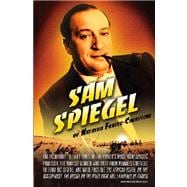
Note: Supplemental materials are not guaranteed with Rental or Used book purchases.
Purchase Benefits
What is included with this book?
| Introduction | p. 1 |
| 1901-1939 | |
| Childhood | p. 11 |
| Palestine | p. 21 |
| San Francisco | p. 27 |
| Berlin | p. 33 |
| Vienna | p. 41 |
| London | p. 47 |
| Paris/Mexico | p. 53 |
| 1939-1954 | |
| Hollywood | p. 61 |
| Tales of Manhattan | p. 69 |
| North Crescent Drive | p. 79 |
| The Stranger | p. 89 |
| The Second Mrs. Spiegel and Horizon Pictures | p. 97 |
| The Prowler and When I Grow Up | p. 111 |
| The African Queen | p. 121 |
| Melba | p. 137 |
| On the Waterfront | p. 147 |
| 1955-1985 | |
| The Third Mrs. Spiegel and The Strange One | p. 165 |
| The Bridge on the River Kwai | p. 177 |
| Suddenly, Last Summer | p. 201 |
| Lawrence of Arabia-Part I | p. 215 |
| Lawrence of Arabia-Part II | p. 239 |
| The Spiegel Lifestyle | p. 253 |
| The Chase, The Happening, The Night of the Generals, and The Swimmer | p. 267 |
| Nicholas and Alexandra | p. 289 |
| The Last Tycoon | p. 305 |
| Betrayal | p. 327 |
| The Final Years | p. 339 |
| Epilogue | p. 347 |
| Author's Note | p. 351 |
| A Condensed Filmography | p. 359 |
| Notes | p. 369 |
| Selected Bibliography | p. 435 |
| Index | p. 443 |
| Photo Credits | p. 465 |
| Table of Contents provided by Rittenhouse. All Rights Reserved. |
The New copy of this book will include any supplemental materials advertised. Please check the title of the book to determine if it should include any access cards, study guides, lab manuals, CDs, etc.
The Used, Rental and eBook copies of this book are not guaranteed to include any supplemental materials. Typically, only the book itself is included. This is true even if the title states it includes any access cards, study guides, lab manuals, CDs, etc.